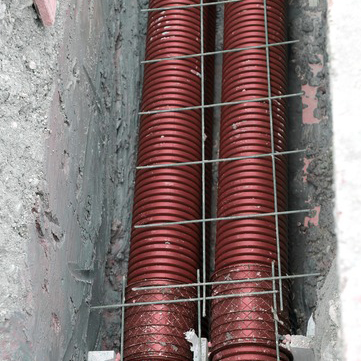When choosing between a wireless and wired network infrastructure, it’s essential to weigh them against each other to determine which solution is the best for your business needs. In many cases, a hybrid approach may provide the ideal balance of flexibility, performance, and security.

Wired Networks
A wired network connects devices using physical cables (like Ethernet), offering high-speed, stable, and secure connectivity.
- Reliability: Once set up, they are less prone to interference or signal loss, making them ideal for mission-critical applications like data centers or financial operations.
- Speed: Wired connections typically offer higher data transfer speeds (especially with modern standards like Gigabit Ethernet), which is crucial for tasks that require moving large amounts of data, such as video editing or data analytics.
- Security: Since wired networks require physical access to the network infrastructure, they are generally more secure. This makes them a good option for businesses handling sensitive information.
Wireless Networks
Wireless networks use Wi-Fi to connect devices, offering mobility and flexibility that wired networks cannot.
- Mobility: Wireless networks provide the flexibility to connect to the network from anywhere within the coverage area, making them ideal for offices, retail environments, and any business with mobile staff.
- Easy Installation and Scalability: Wireless networks are easier to install and expand as your business grows. New devices can be added without running additional cables, which saves time and costs, especially in open or temporary workspaces.
- Cost-Effective for Small Spaces: For small businesses or offices, a wireless network might be more cost-effective since there’s no need for extensive wiring and hardware installation.
The Hybrid Approach
For many businesses, a hybrid approach that integrates both wired and wireless network infrastructures can offer the most benefits. This setup allows businesses to leverage the speed and reliability of wired networks for stationary devices and critical systems while utilizing the flexibility of wireless networks for mobile devices and less data-intensive tasks.
Which is Right for Your Business?
For organizations that prioritize speed, security, and reliability—such as financial services or healthcare providers—a wired network may be the better option. On the other hand, businesses that require flexibility, mobility, and cost-effective solutions—such as retail environments or coworking spaces—may benefit more from a wireless network.
In most cases, a hybrid network solution offers the best of both worlds. It allows businesses to optimize their infrastructure for both performance and flexibility, ensuring that both stationary and mobile devices can connect efficiently and securely.
Need Help Designing Your Network?
At ProLink Communications, we specialize in designing and implementing customized network solutions that meet your specific business needs. Whether you’re looking for a wireless, wired, or hybrid infrastructure, our experienced team can ensure that your network is fast, secure, and scalable. Contact us today at 615-236-0051 to learn how we can optimize your business’s network infrastructure.








